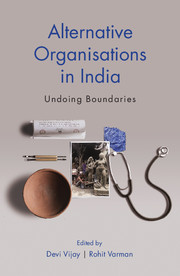Book contents
- Frontmatter
- Dedication
- Contents
- List of Tables and Figures
- Acknowledgements
- Chapter 1 Introduction: Undoing Boundaries
- Chapter 2 Formal and Informal Technologies of Alternative Organisational Spaces within the State: An Analysis of Violence, Wrongdoing and Policing
- Chapter 3 Scripting Alternative Images: Institutions, Practices and Scripts of the Mritshilpis of Kumortuli
- Chapter 4 Shelter for Homeless: Ethnography of Invisibility and Self-exclusion
- Chapter 5 Alternative Spaces of Employment Generation in India: Informal Rules, Structures, and Conflicting Organisational Requirements
- Chapter 6 Shaheed Hospital: Alternative Organisation, Ideology and Social Movement
- Chapter 7 Acting for Change: A Circuits of Power Analysis of a Denotified Nomadic Tribe and Budhan Theater's Struggle for Change
- Chapter 8 Swaraj: An Alternative University
- Chapter 9 Alternative Organisations: Spaces for Contestation
- Contributors
- Index
Chapter 5 - Alternative Spaces of Employment Generation in India: Informal Rules, Structures, and Conflicting Organisational Requirements
Published online by Cambridge University Press: 05 April 2018
- Frontmatter
- Dedication
- Contents
- List of Tables and Figures
- Acknowledgements
- Chapter 1 Introduction: Undoing Boundaries
- Chapter 2 Formal and Informal Technologies of Alternative Organisational Spaces within the State: An Analysis of Violence, Wrongdoing and Policing
- Chapter 3 Scripting Alternative Images: Institutions, Practices and Scripts of the Mritshilpis of Kumortuli
- Chapter 4 Shelter for Homeless: Ethnography of Invisibility and Self-exclusion
- Chapter 5 Alternative Spaces of Employment Generation in India: Informal Rules, Structures, and Conflicting Organisational Requirements
- Chapter 6 Shaheed Hospital: Alternative Organisation, Ideology and Social Movement
- Chapter 7 Acting for Change: A Circuits of Power Analysis of a Denotified Nomadic Tribe and Budhan Theater's Struggle for Change
- Chapter 8 Swaraj: An Alternative University
- Chapter 9 Alternative Organisations: Spaces for Contestation
- Contributors
- Index
Summary
This chapter is about how panchayats, institutions of rural local government in India, cope with conflicting organisational requirements. These requirements arise from the need to harmonise the organisation's internal processes with constraints imposed by the other organisations involved in rural development projects and the electoral necessity of satisfying popular aspirations. Using ethnographic methods like participant observations and unstructured interviews we analyse implementation of the Mahatma Gandhi National Rural Employment Guarantee Act (MGNREGA) in three districts of the eastern Indian state of West Bengal. Our study reveals that conflicting organisational requirements and stakeholder interests necessitate deviations from prescribed procedures. In such a situation a panchayat's success depends on its ability to camouflage deviations by formulation and enforcement of informal rules with the active support of different stakeholders. The present three-tier panchayats in West Bengal came into existence in 1978.
During its prolonged and uninterrupted existence, it has been entrusted with the responsibility of providing all services required by the rural citizens (Robinson, 2005). This not only makes it an important institution for rural citizens but also imparts considerable political importance to it. It is acknowledged that winning the panchayat elections is the first step towards forming a government at the state level (Chakrabarti, 2016). While a panchayat's political importance makes it prone to perils of partisan politics (Kundu, 2009), inadequate fiscal decentralisation makes it dependent on external funding agencies (Robinson, 2005). Thus, panchayats not only have to deal with their internal processes formulated by the Panchayati Raj Department, but have to abide by funding agencies’ guidelines. Moreover, the presence of different political combinations at different tiers of panchayat and dynamics of politician-bureaucracy relationship make partisan politics integral to their functioning.
The MGNREGA, with a dual focus on providing guaranteed employment and creating rural assets, is the flagship rural development initiative of the Indian government. While the financial liability of the MGNREGA is shared by the union and state governments in 75:25 ratio, panchayats are responsible for identifying works, framing projects, selecting beneficiaries, executing projects and paying wages. However, panchayats have to perform the above functions after complying with the guidelines issued by the union and state governments (MoRD, 2008). The MGNREGA's relationship with rural livelihood also makes it a politically important programme.
- Type
- Chapter
- Information
- Alternative Organisations in IndiaUndoing Boundaries, pp. 125 - 151Publisher: Cambridge University PressPrint publication year: 2017



